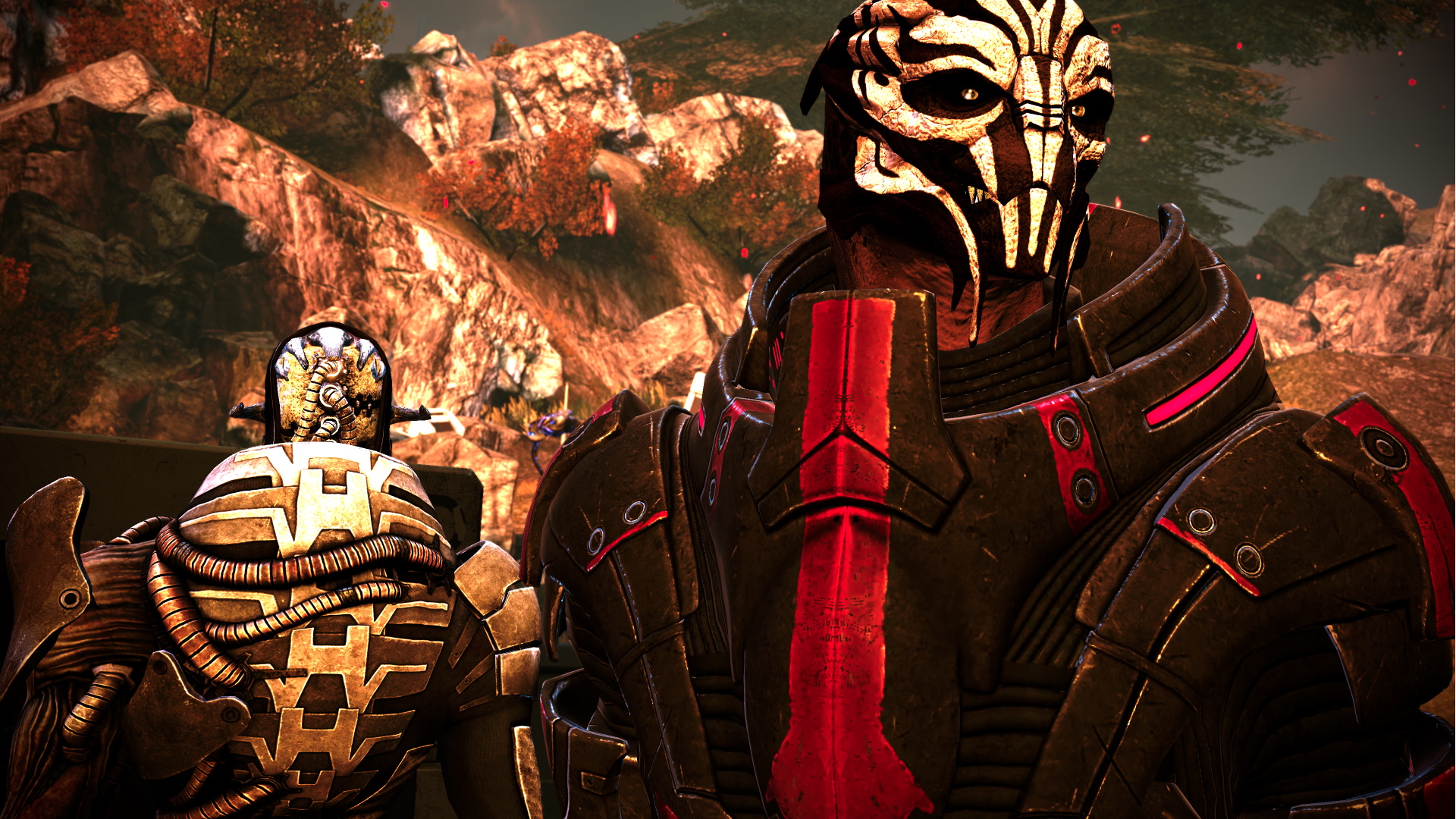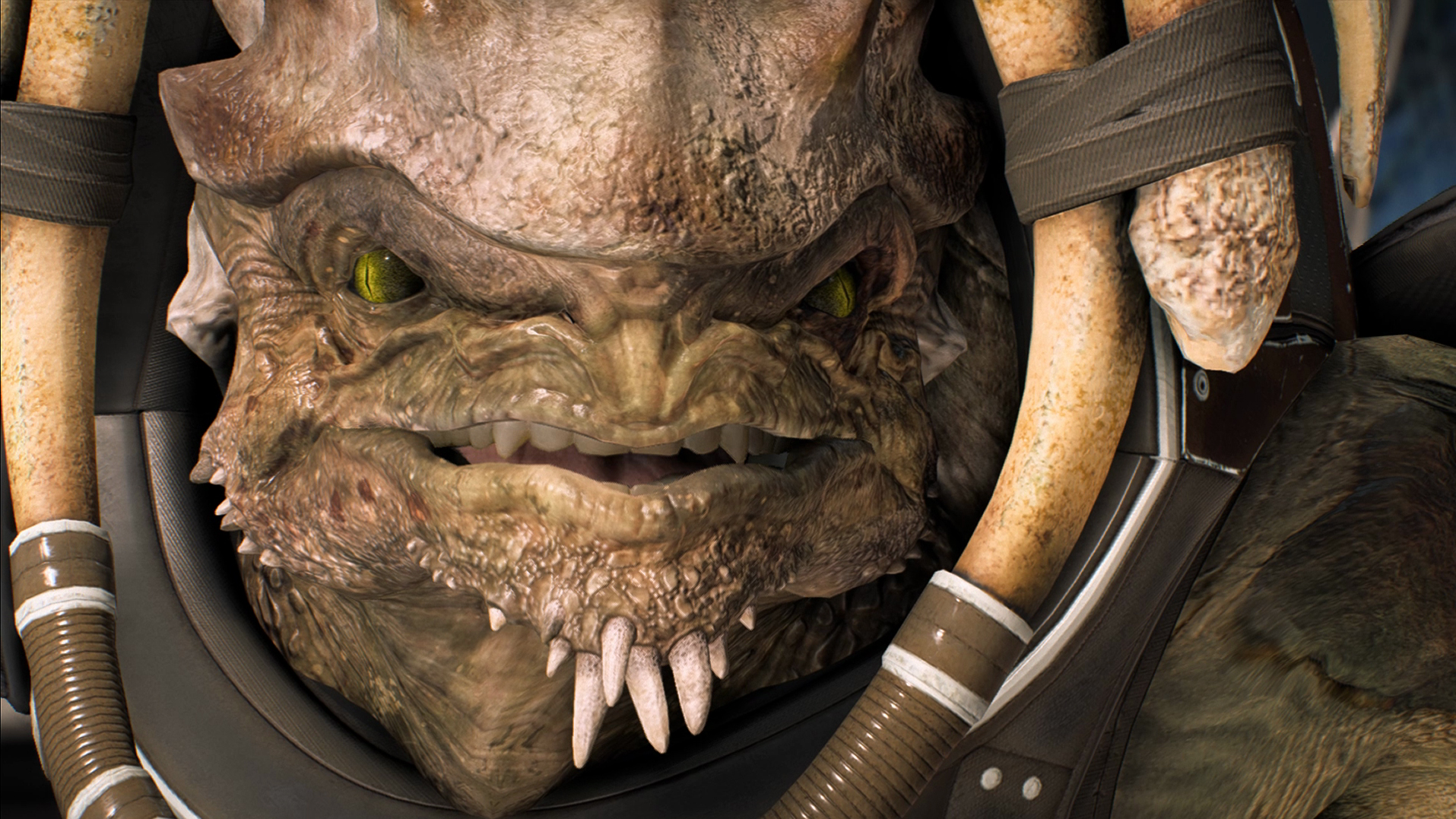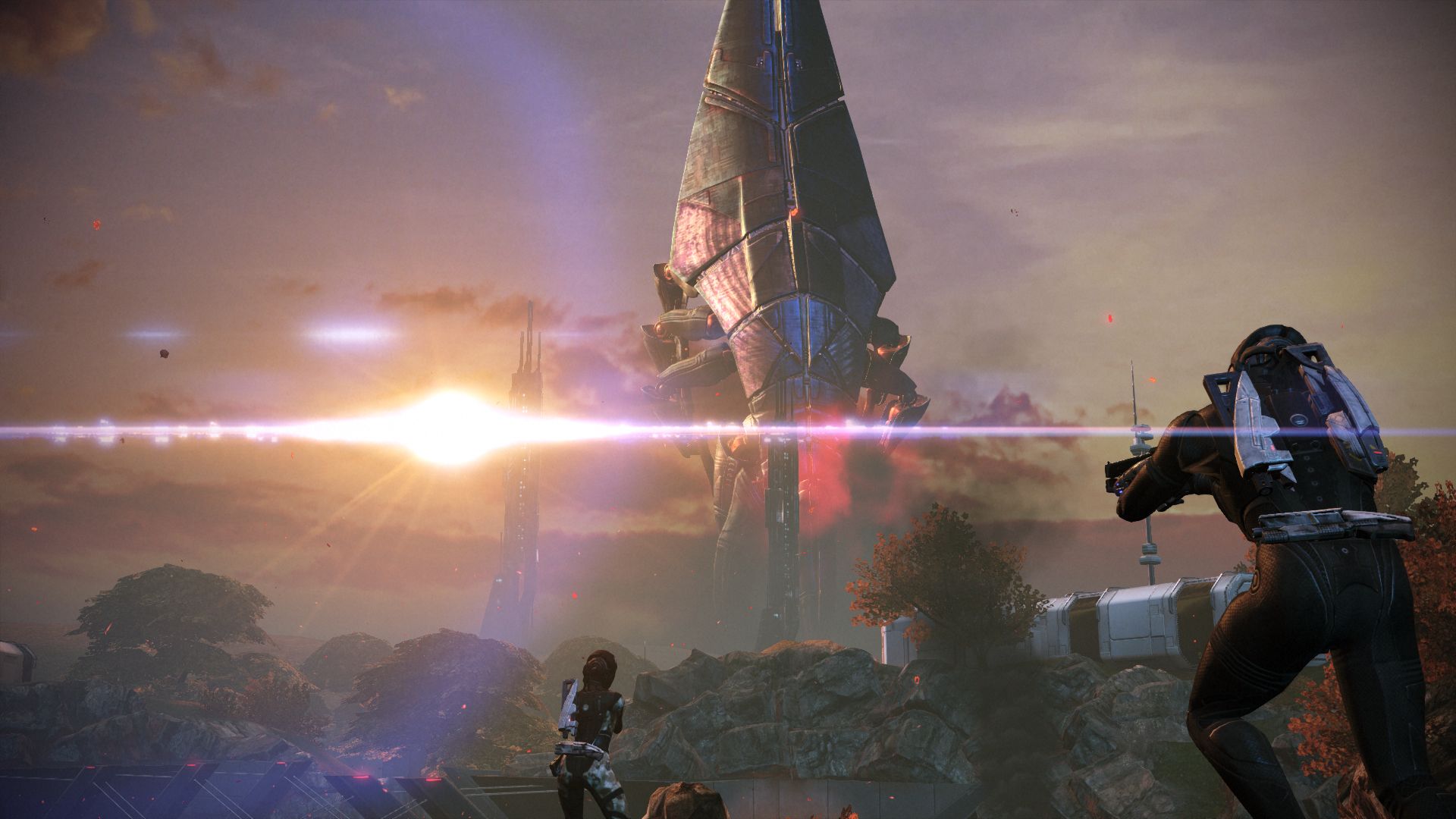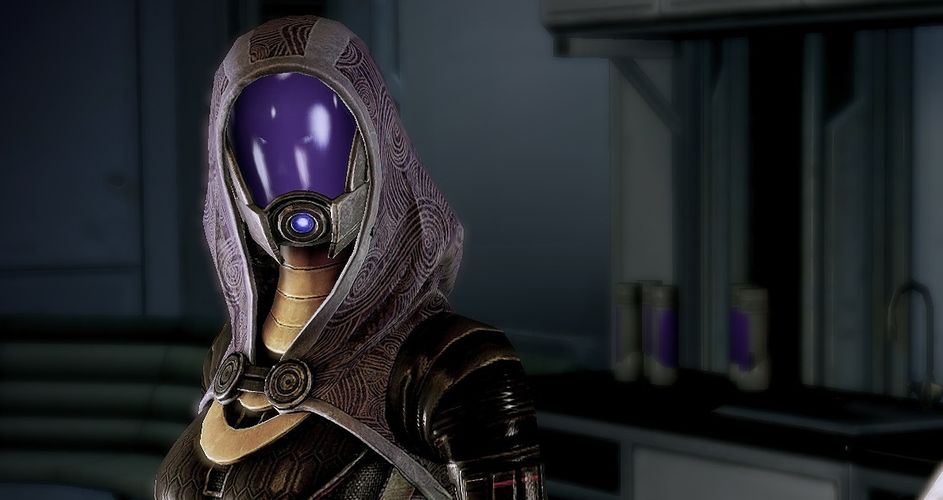After talking to a scientist, Mass Effect's aliens are more believable than I ever expected | PC Gamer - majortindrithe
After speaking to a man of science, Volume Effect's aliens are more presumptive than I e'er expected

When it comes to aliens, Mass Effect leaves no options unexplored. You can fight alongside them, war with them, befriend them, joke with them, and, yes, even have excite with a a couple of of them. It's a space opera where man is sporting one tiny fraction of a much bigger astronomical community of intelligent species, ranging from the dour, animal Turians to the heartfelt and very squishy Hanar.
You can't shed a pit in Stack Effect's version of our Opaque Way wandflower without hitting a virgin unknown species. But for astronomers like Set Shostak, the search for aliens isn't quite so wanton. "You do what Jodie Adoptive did in the movie Contact," Shostak tells me over the phone. "You use big antennas, you point them at nearby star topology systems that mightiness have a satellite with whatsoever aliens thereon, and you prove and eavesdrop on any signals they may be broadcasting."
What is the SETI Institute?

SETI stands for the "search for extraterrestrial intelligence operation" and is a collective term to describe our research into the statistical likeliness that we'ray not alone in the universe. The SETI Institute is good one of many different initiatives, founded in 1984 as a non-profit organization largely funded by private contributions.
With an estimated 400 billion planets in the Whitish Way galaxy, withal, the betting odds are stacked against us. "You put on't know which direction to point the antenna, you father't know where on the radio telephone dial the signal power come up in, and—most multitude don't roll in the hay this—you point in that direction and you might be hearing to millions of frequencies at a clock, but they all get about trine minutes of listening pleasure. You birth to hope that the signals you are looking for are persistent enough that they arrive at your transmitting aerial at the exact proper sentence you'ray looking for, and the universe of discourse has been around for 13.5 billion years, so the chances aren't of import."
It's ridiculous to assume that Mass Effect's depictions of aliens could make up at complete accurate, but I wanted to call for Shostak about them anyway and explore the common mistakes that skill fable makes in depicting alien life sentence.
With a doctorate in astronomy from the California Institute of Technology, Shostak has spent most of his career writing about space and conducting radio set uranology research. He kit and caboodle as a ranking astronomer at the SETI Establish, spearheading different research initiatives like using radio and optical telescopes to search for signs of possible life in our galaxy. He's i of the few people on the planet who can call themselves an alien hunter without raising some eyebrows.
Along with around a century another scientists, Shostak works tirelessly to CAT scan the stars for anything that might indicate we're non alone. He's at the cutting edge of an altogether hypothetical branch of scientific discipline: the study of extraterrestrial being life. While no indefinite truly knows what level-headed life might be, Shostak at least has some science to back up his hypotheses.
Heads ahead: This story has big spoilers for the entire Mass Effect serial publication.
Sci-fi aliens look like us because it's convenient
In Masses Effect's lore, humanity discovers ancient alien technology orbiting Hades that can transport ships to the outlying reaches of the galaxy. This discovery sparks a gold age of human expansion start in the year 2150, but also leads to a pivotal discovery. Humans are surrounded by a big profession of sound species that didn't know we existed.
At the center of that community is an enormous distance place called The Citadel where gobs of species co-exist unneurotic harmoniously. Walking through The Citadel is like taking a stroll through Heathrow Airport, except the travellers you pass are human-sized jellyfish, rotund little moles, alarming insectoids, and Gorilla gorilla-like lizards. Information technology makes for whatever great sci-fi, but unsurprisingly, Shostak says that IT's unlikely humanity will always rub elbows with aliens at some great cosmic bloc party. In that respect's just style besides many an problems to overcome.
Just about of Mass Effect's races are biped creatures with two legs, two blazonry, mouths, ears, and—judgment by the series' romance scenes—butts. IT's part of a long tradition in sci-fi that exists because of the practical challenges in telling a account roughly creatures that could be beyond our comprehension. "If the portrayed aliens were to bet like my bicycle in my garage, you couldn't relate to it and you wouldn't roll in the hay what it was," Shostak says. "Just if it's just a guy with zero tomentum and just a bit shorter in height leastways you could relate to him. You arse really receive an alien that looks like anything, only then you motivation a backstory that tells the audience that this is an alien. So [devising them humanoid] is a shortcut. We have this unconscious melodic theme of what aliens are like and you assume't cause to explain it if you survive with the painting alien."

Shostak says this is because our understanding of life is entirely supported our knowledge of Earth—of which all its life shares common ancestors through evolution. But because we're simply a product of our surround, we can't know how evolution power form a tool surviving on a unlike major planet.
That derriere be taken in some pretty chaotic directions. In the 1957 sci-fi new by famous English astronomer Fred Hoyle, The Black Obnubilate, a colossus super-intelligent cloud arrives in our solar system and unknowingly causes dramatic global climate change by blocking come out of the closet the solarize. Verner Vinge's A Fire Upon the Deep imagines a race of tooth aliens named Tines where to each one person is actually a radical-mind consisting of sestet individual dogs that communicate to unrivalled another using fleshy organs that emit soundwaves. It's weird.
While it's sport to suppose life taking the shape as something soh mind-deflexion, Mass Upshot actually makes some damn beatific assumptions about exotic life—even if it's overly positive that all those species would get along so easily.
Alien biology
Are Mickle Gist's aliens biologically right?
Mass Effect's core premise is that aliens, like the States, are products of evolution over millions and millions of years. That might not be true, but because we don't have any examples of a life sentence that doesn't adhere to the laws of Darwinism, we preceptor't know for sure.
Here's what Mass Effect gets right-minded and wrong about its alien biology:

It's rattling expected aliens would undergo a similar form to us
Assuming we evolved in similar ecosystems, that is. This is supported the "merging evolution" theory, the idea that organisms don't germinate randomly but develop similar features and characteristics despite non having a common antecedent with those same features. Essentially, evolution pushes us into optimal configurations, which explains wherefore then many species on Earth severally evolved eyes.
We could divvy up plenty of other features with aliens, overly. "First off, we feature this bipedalism, this semi-upright stance," Shostak says. "That has survival esteem if you'ray playing around in savannahs for a couple c cardinal years because you can see over the grass. With deuce legs, you can picture over the topography so you can stag something that wants to eat you or you want to eat."
Having two arms, though? That's just an fortuity
"In that location's a fish called a Tiktaalik that is the ancestor of USA and completely the four-appendaged beings on the Globe," Shostak explains. "And if you think some it, four is not the regular figure [of appendages] along Earth. That number is six—because of all those insects. Six apparently works, and you could imagine that the aliens have two appendages for close and and so four for using tools operating room playing the piano, and that would make sense likewise. That we honorable have four limbs is antimonopoly an accident."
According to Shostak, then, Mass Effect's aliens should probably have more potpourri in their configuration of limbs.

Mass Effect's aliens are generally consistent with the laws of phylogeny
The Krogan are a perfect example. Born on an extremely opposing major planet rife with terrifying predators and austere climates, the Krogan were the bottom of the food strand and spent most of their collective history Eastern Samoa prey. Alike a lot of reptiles, they evolved side-cladding eyes as a defence mechanism so they could more easily spot inbound predators, and their hyperactive reproductive systems ensured the species could replenish in such a fatal ecosystem.
This kinda evolutionary logic is present in wholly of Mass Effect's primary alien species, which is a big reason why its depiction of a far-future world is so likely. But just because we might feeling the unvaried doesn't mean we'll ever so understand one another.
Reproductive sex with aliens is emphatically not connected the shelve
"It's like contemplating having sex with the house flies that nonplus in direct the front end door," Shostak says. "On that point's a biological incompatibility. Information technology wouldn't work for complete sorts of reasons. The idea that you'd have that sort of relationship with an stranger, well, dream on. They'ray probably not going to have DNA to begin with, and the whole setup wish be different, and on the far side that maybe they haven't showered in a week—who knows?"
Of course of instruction, that's viewing sex strictly Eastern Samoa a means of breeding. Spate Issue's sex scenes are an manifestation of two characters' touched attachment to one another, which is a trouble that can be resolved with a little creativity.
Our biology would make colonizing strange worlds a logistical nightmare
You'd belik die.
Seth Shostak
"Your first thought is, oh, fountainhead there's oxygen in everyone's thoughts and there's plants around, I'll just make a living here," he explains. "Simply you can't forget about your gut bacteria, because those are going to be different in terms of their function in another world and they're not DNA-settled soh they can't really assistant you. You'd believably die."
One of the shortcomings of organic evolution is that it is specific to united kind of ecosystem. And world are still pretty new as a species. We've scarce adapted to Earth's different climates, then hopping between various planets would probably kill us.
If people can't even eat up food from different countries without unhappy from diarrhea, how will our bodies handle eating completely alien foods? It's non just food that needs consideration, either. Subtle variations in graveness, radiation, ozone musical composition, and bacterium would all present significant threats to our survival happening other planets. In order to pull round, colonies would likely need to constantly transport food and water from their homeworld or terraform part of the planet to be more comfortable. Mass Effect mostly waves these issues away with convenient subject field advances, but at least it doesn't ignore them entirely like most sci-fi stories do. The Quarians, for example, are an alien raceway that most ne'er takes off their highly specialized enviro-suits because their immune systems are so fragile. In reality, that kind of technology might be required aside any species that travels the galaxy.
Alien communication
Mass Effect avoids real issues with communication
There are common-sense rules that are in all likelihood to be organizing principles in any society that protect the society as a whole.
Seth Shostak
Evolutionary biology is just one of the dozens of conundrums we face when thinking about aliens. Shostak's work at the SETI Institute is the image of taking things one step at once. Once scientists discover a signal that power be alien in origin, it raises the big inquiry of how we'll ever communicate and descriptor a family relationship with those beings—or whether we should even attempt to make tangency.
Making impinging with aliens is where Flock Effect (and most sci-fi) takes the sterling liberties in spare-time activity of a story. With so many different species coexisting on The Citadel, Bioware had to solve a logistical nightmare: How come they every communicate? That's where Mass Upshot's universal translators come in, tiny AI-steam-powered devices that translate voice communication in real-prison term. Everyone has one, but they're barely mentioned in the story except A a footnote for anyone who on the spur of the moment realizes how weird it is that all the aliens speak perfect West Germanic language. It's an easy affair to ignore for the sake of the story, though. I can't imagine philander scenes would be all that enticing if Commander Sam Shepard used simple hand gestures while silently mouthing the words "me sex you straight off?"

Alien psychological science might be incompatible with ours
Before we can even broach the issue of having sex with aliens, though, there's a minefield of complications to navigate first. Similar, do these theoretic aliens even have a concept of what a "you" is? Just because aliens are intelligent doesn't mean they mechanically take in concepts for community, lie with, green-eyed monster, or some of the abstract thoughts and emotions that separate the States from different animals.
Shostak makes a pretty good argument in favou of Mass Effect's aliens, though: A lot of our abstract concepts and emotions are extrapolated by our drive to survive as organisms. "The fact that the law protects you from being murdered past your next door neighbor, that's true of every country—though it might not beryllium enforced," Shostak says. "At that place are common-sense rules that are likely to be organizing principles in any society that protect the society as a intact. It's just Darwinism but extrapolated to the courts. You can't cancel out the neighbors with impunity because in the remainder that would destroy the society."
Even out if aliens have a society with suchlike principles, that doesn't mean they'd treat us American Samoa equals operating theater welcome US into IT. Hell, human story is au fon united long sheath study of humans slaughtering other humans finished the tiniest differences in culture, religion, and appearance. Information technology's pretty likely that any grimace-to-face encounters with aliens would have likewise sophisticated (and bloody) outcomes—something which Flock Upshot also explores in great detail.

Alien technology
Real-lifetime aliens are probably too advanced for U.S.
The biggest barrier between two alien species communicating is the likelihood that one will personify unfathomably more advanced than the other. Remember: The galaxy has been round for billions of years and, arsenic farther as we can tell, life could have started at any time in our distant past. The first aliens we receive might be then technologically advanced that we would be incapable of relating to one another.
"In the first Whiz Wars," Shostak says, "they're all in this cafe in Mos Eisley. They're playing music, there's a bunch of creatures and they're all acquiring on. But in fact, if you take hold of the nearest 10 societies in the galaxy and invite them all to a cafe, they'd be [injured] in growth aside millions of years on the average. They'rhenium not going to sit down there and share a drink any more than I'd share a drink with a gosh darn squirrel!"
Aliens power not even recognize the States as intelligent
There's a very serious possibility that if we do encounter aliens, they won't destroy us because they hate us. They might exactly destroy us because they preceptor't even recognize us equally animation things. "When I walk into my backyard, I don't do it with the melodic theme that I'll kill ants," Shostak says. "I just walk out in that location for completely different reasons that the ants will never sympathize, and maybe I accidentally step on some."
This is one of the biggest inaccuracies when it comes to science fiction, Shostak explains. But, this is some other area where Bioware's writers clearly did their research. Quite a little Upshot cleverly has a solution for this problem: None of the stranger civilizations existing in its mankind are aged than 50,000 days. This isn't in truth understood until later, when players discover that a terrifying race of sentient machines is concealment out in the void on the far side the galaxy and periodically harvesting all intelligent life in the galaxy Eastern Samoa part of a nefarious (and convoluted) plan to bring through the galaxy.
Every alien civilization you encounter in Raft Outcome is roughly the same age, and because every of them heavily rely on ancient alienate applied science they just understand, they're besides relatively equal in terms of technological promotion. None of Mass Effect's alien species even qualify As a Case 2 civilization on the Kardashev graduated table.
Aliens are more in all likelihood to live synthetic than biological
Our successors—which we'Ra building ourselves, actually—are likely to be thinking hardware, not soft, squishy biology.
Seth Shostak
Giant, evil space machines comparable Whole lot Effect's Reapers mightiness seem like one and only of the most unrealistic parts of the game, but you'd be surprised. Animate machines are probably what we're most likely to encounter when explorative the galaxy for alien life.
"The fundamental point in time [with sci-fi aliens] is that they incline to exist projections of our own future," Shostak says. "And if you're really honest about that, you realize that the thing we're doing in the 20th hundred is inventing generalized artificial intelligence. And if you talk to citizenry WHO work in that field, they each figure that within half a century all the best books and music leave be written aside machines. They're getting to the point where they can take off over journalism jobs. In any caseful, our successors—which we're construction ourselves, in reality—are likely to make up thinking hardware, non soft, squishy biology."
Shostak believes it's probably that an advanced alien species will be logical in nature. If that's the case, then that changes everything. "One individual can just hang around indefinitely and just become the entire society," Shostak says. "The altogether society could be unrivalled automobile."
Anyone who has played the Mass Effect serial to completion knows that this is what the series is fundamentally well-nig. Its entire thesis is that organic life inevitably invents synthetic life which in turn inevitably rebels and kills all organic life. A ceaseless Hz of destruction. Part of what makes Make Outcome 3's ending so unfulfilling (aside from beingness highly whacky) is that IT pretends that organic and machine life fusing together into a original rather being isn't the painfully obvious solution.
In reality, Shostak says, it's likely that humans will one 24-hour interval transcend our natural biological forms because agglutinative ones will embody so much more capable. In that respect's no grounds to bear aliens won't do the same.

Conclusion
Mass Effect's aliens? Pretty anathemise good.
Like whol sci-fi, Mass Effect requires you to partially suspend your disbelief in order to bask its story approximately humanity unraveling a dignified conspiracy to control all life in the wandflower. But after spending much time researching its complex lore and speaking with Shostak, I have an symmetric deeper honor for IT. Aggregated Core's go up to aliens is multi-magnitude and logical, and plane if it sidesteps few of the very real problems integral in our ultimate contact with alien life, IT almost ever has a convincing explanation. At that place aren't many a loopholes. Maybe that's why the few that do exist, like its close, are so thwarting.
Where Mass Effect bends the truth the virtually is when it comes to the ancient technology and mysterious Element Zero that makes galactic travel instantaneous. But, hey, Mass Effect would live pretty damn boring if it took hundreds of days to get anywhere. That's really the biggest deviation between Bioware's seminal RPG and our own search for aliens. Even if we do find them, we'll Be separated aside an impossibly vast gulf of space. Even out exchanging a simple "hullo" would postulate several lifetimes.
"Einstein says you can't go the quicken of light or quicker, and arsenic removed as we know Einstein seems to be right virtually that—in that respect's entirely sorts of caveats, obviously," Shostak says. "Merely that means if aliens are a hundred light-old age away and you send them an abusive statement, it takes a hundred years exactly to get there. If their reception is, 'Bitstock yourself, we're sending our interstellar battleships to wipe away you unconscious,' all of that takes so much time that I think up the whole thing becomes turn over. In that location's this tyranny of distance that exists thusly that you can't do anything promptly, and maybe that's what saves us. Maybe that's what saves everything in the galaxy—we really send away't mickle with one and only another because we're all [too distribute out]."
- Mass Effect pass over : Everything to know
- Mass Effect solicit : All available characters
- Mass Gist ending : How to keep everyone alive
Source: https://www.pcgamer.com/after-talking-to-a-scientist-mass-effects-aliens-are-more-believable-than-i-ever-expected/
Posted by: majortindrithe.blogspot.com



0 Response to "After talking to a scientist, Mass Effect's aliens are more believable than I ever expected | PC Gamer - majortindrithe"
Post a Comment